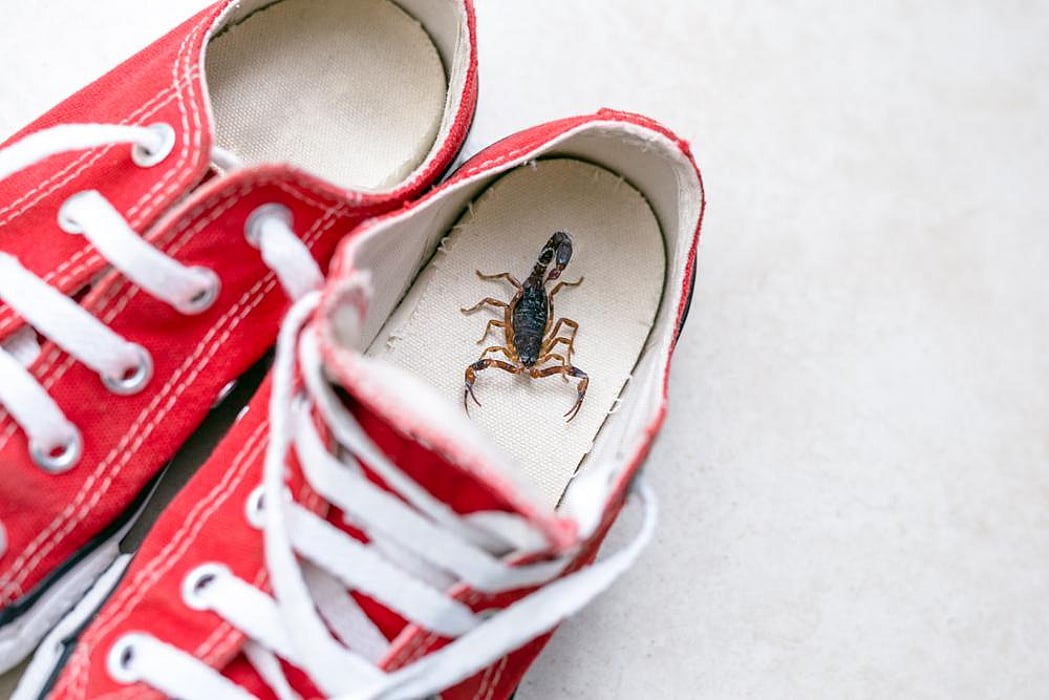Spider and Scorpion Bites

What should I do if my child is bitten by a spider or scorpion?
Most spider bites are harmless, causing redness and swelling at the site but no serious risk, so you can probably relax. The only spiders that pose a real danger are black widow and brown recluse spiders. Scorpions are also potentially dangerous. The symptoms of a scorpion sting are similar to those of black widow bites: local pain and swelling, and severe muscle cramps. Tarantulas may look scary, but their bite is no more threatening than a bee sting. In all, about 50 spiders in the United States give bites that may be painful but aren't dangerous.
If you suspect that your child has been bitten by a brown recluse or black widow spider or stung by a scorpion, call your doctor or take your child to the nearest emergency room. Otherwise, you can safely treat the wound at home. Wash the site thoroughly with soap and water, and apply an ice pack or ice cube to reduce any swelling and redness. If it hurts, give your child acetaminophen or ibuprofen as needed. The swelling and redness should go away in a day or two.
How do I know if it's a dangerous spider?
Black widows are shiny black with a red hourglass mark on the belly. Brown recluse spiders (sometimes called fiddler spiders) are brown with a violin-shaped mark on the back. If you see the spider that bit your child, try to capture it -- dead or alive -- in case your child needs to see a doctor. (Be careful not to get bitten yourself!) If you think it is either a black widow or a brown recluse, call your child's physician immediately. There are injections that can neutralize the venom.
What if I don't see the spider?
In most cases you won't -- the spider will be long gone by the time you notice the bite. Don't worry. Since most spider bites are harmless, the most important thing is to treat the site and ease pain and swelling. Over the next few days watch your child for any symptoms that might call for a doctor's attention.
What if the bite doesn't heal?
If the wound turns into a blister or begins to look purple and infected, call your physician. He or she may decide to prescribe an antibiotic.
Is there any way to prevent spider bites?
If you and your family love the great outdoors, carefully check outdoor toilets before your child uses them. Many black widow bites occur on the buttocks and genital areas of people using these facilities. Also warn your children to be careful around wood piles, where spiders are likely to lurk.
At home, reduce the number of spiders that share your house. Rather than using insecticides, which contain potentially toxic chemicals, use your vacuum regularly to suck up spiders and their egg sacs. Concentrate on corners and the ceiling -- and anywhere spiderwebs appear. A small handheld, battery-operated vacuum can make the job easy. (Leave the daddy longlegs alone, though -- they can't hurt you.)
Also, make a habit of picking up clothing, since most bites occur when children put on shoes or clothes if they've been left on the floor. Shake out your child's clothes, blankets, and other bedding if they've been on the floor overnight. Spiders bite when they're squeezed between fabric and skin.
References
American Academy of Pediatrics, Caring for Your Baby and Young Child: Birth to Age Five Years. 5th edition.
American Medical Association, Insect Stings and Bites
American Academy of Dermatology, Take the "Bite" Out of Summer
Image credit: Shutterstock
Related Posts
Risk for COVID-19-Linked Endocarditis Up in Patients With Opioid, Cocaine Use Disorders
TUESDAY, Jan. 3, 2023 (HealthDay News) -- Patients with opioid use disorder...
States Claim Sackler Family Members Are Abusing Bankruptcy Process
WEDNESDAY, Dec. 1, 2021 (HealthDay News) -- A settlement that gives protections...
U.S. Suicide Rates Began to Rise Again in 2021
THURSDAY, April 13, 2023 (HealthDay News) -- In a disappointing finding, a new...
U.S. Making It Easier to Access COVID-19 Treatment Paxlovid
FRIDAY, May 27, 2022 (HealthDay News) -- Getting a hold of the COVID-19...
